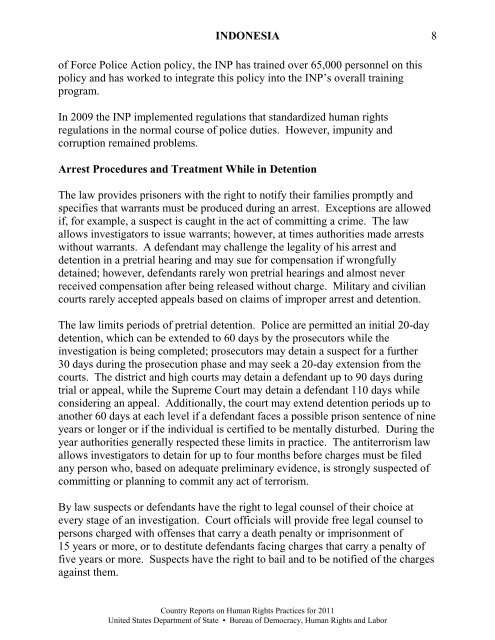INDONESIA EXECUTIVE SUMMARY Indonesia is a multiparty ...
INDONESIA EXECUTIVE SUMMARY Indonesia is a multiparty ...
INDONESIA EXECUTIVE SUMMARY Indonesia is a multiparty ...
Create successful ePaper yourself
Turn your PDF publications into a flip-book with our unique Google optimized e-Paper software.
<strong>INDONESIA</strong> 8<br />
of Force Police Action policy, the INP has trained over 65,000 personnel on th<strong>is</strong><br />
policy and has worked to integrate th<strong>is</strong> policy into the INP’s overall training<br />
program.<br />
In 2009 the INP implemented regulations that standardized human rights<br />
regulations in the normal course of police duties. However, impunity and<br />
corruption remained problems.<br />
Arrest Procedures and Treatment While in Detention<br />
The law provides pr<strong>is</strong>oners with the right to notify their families promptly and<br />
specifies that warrants must be produced during an arrest. Exceptions are allowed<br />
if, for example, a suspect <strong>is</strong> caught in the act of committing a crime. The law<br />
allows investigators to <strong>is</strong>sue warrants; however, at times authorities made arrests<br />
without warrants. A defendant may challenge the legality of h<strong>is</strong> arrest and<br />
detention in a pretrial hearing and may sue for compensation if wrongfully<br />
detained; however, defendants rarely won pretrial hearings and almost never<br />
received compensation after being released without charge. Military and civilian<br />
courts rarely accepted appeals based on claims of improper arrest and detention.<br />
The law limits periods of pretrial detention. Police are permitted an initial 20-day<br />
detention, which can be extended to 60 days by the prosecutors while the<br />
investigation <strong>is</strong> being completed; prosecutors may detain a suspect for a further<br />
30 days during the prosecution phase and may seek a 20-day extension from the<br />
courts. The d<strong>is</strong>trict and high courts may detain a defendant up to 90 days during<br />
trial or appeal, while the Supreme Court may detain a defendant 110 days while<br />
considering an appeal. Additionally, the court may extend detention periods up to<br />
another 60 days at each level if a defendant faces a possible pr<strong>is</strong>on sentence of nine<br />
years or longer or if the individual <strong>is</strong> certified to be mentally d<strong>is</strong>turbed. During the<br />
year authorities generally respected these limits in practice. The antiterror<strong>is</strong>m law<br />
allows investigators to detain for up to four months before charges must be filed<br />
any person who, based on adequate preliminary evidence, <strong>is</strong> strongly suspected of<br />
committing or planning to commit any act of terror<strong>is</strong>m.<br />
By law suspects or defendants have the right to legal counsel of their choice at<br />
every stage of an investigation. Court officials will provide free legal counsel to<br />
persons charged with offenses that carry a death penalty or impr<strong>is</strong>onment of<br />
15 years or more, or to destitute defendants facing charges that carry a penalty of<br />
five years or more. Suspects have the right to bail and to be notified of the charges<br />
against them.<br />
Country Reports on Human Rights Practices for 2011<br />
United States Department of State • Bureau of Democracy, Human Rights and Labor
















